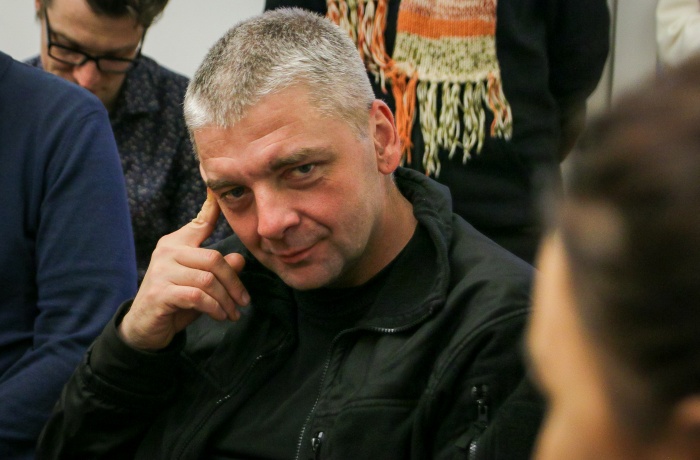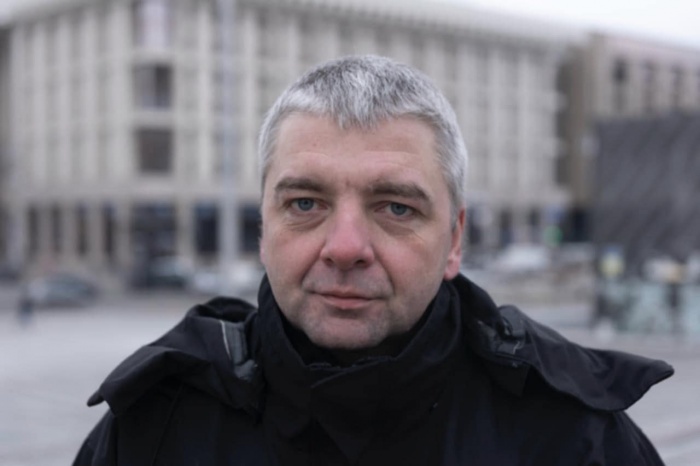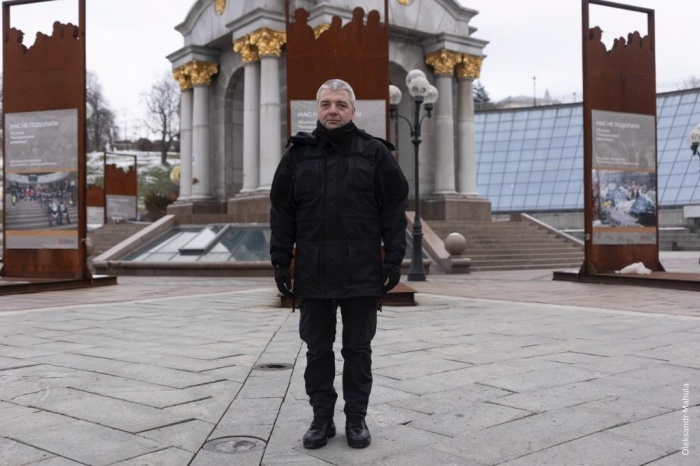
This year, Maksym Butkevych, with Kartveli documentary filmmaker Giorgi Mrevlishvili and Ukrainian activist Liudmyla Huseinova, will be selecting the winners as part of the RIGHTS NOW! festival jury. Maksym is a well-known journalist, human rights defender, and long-time moderator of the Docudays UA festival. In the early days of the full-scale invasion, he voluntarily enlisted in the Armed Forces of Ukraine and was captured in the summer of 2022. After two years and four months in captivity, Maksym was released and has become one of the most powerful voices of Ukrainian prisoners of war. Anastasiia Bahalika, head of the Human Rights Department of Docudays UA, spoke with Butkevych about the power of values and the challenges of war.
Why are human rights still such a vital topic in the fourth year of the war?
Human rights are more relevant now than ever. It may sound cliché, but human rights are among the first casualties of war. They are inevitably restricted and violated even in a liberation, defence, and justice war. I recently spoke with a colleague abroad who said that, from the European human rights community perspective, Ukraine is the country where the rights to freedom of expression or freedom from discrimination are currently most infringed. But in reality, the most massively violated right here is the right to life — because this is a war!
According to modern human rights concepts, two fundamental rights must never be restricted: the right to freedom from torture and the right to freedom from slavery. I can say from personal experience that both of these rights are systematically violated, including in the occupied territories. I was in that exact situation.
There's another reason human rights are so crucial now. It might not be evident to other countries, but Ukrainians understand that this is not a war for resources. Russia doesn't just want our territory — they don't even know what to do with it. This is a war of worldviews. As a society, we truly have a different system of values.
Of course, the military situation and our exhaustion inevitably lead to restrictions on rights. We're not unique in that. Any state that receives extra powers and control over people's lives is usually reluctant to return those powers. When the war ends — and it will, eventually — we will need to return to being a democratic society, a community of people who want to live freely and with mutual respect, even in conflict.
I'll also share my personal experience. Like many thousands of our fellow citizens, I was in a place where human rights were meaningless. The only mention of them was on a paper posted in the barrack with a quote from Article 2 of the Russian Constitution about "human rights." I used to read it every morning, sometimes aloud, and we would laugh. When you've been in a place where human life has no value, you truly understand the importance of cherishing and protecting rights — including with weapons in hand.
Maksym Butkevych. Photo: Oleksandr Magula
Are we a democratic society right now?
That's a tough question — it depends on what you compare us to. I feared the worst while I was in captivity. I thought I'd return to a tightly controlled, black-and-white society run by manual control, without public discussions, investigative journalism, or criticism. A war of attrition that goes on this long inevitably impacts these things. But it turned out not to be as bad as I expected. Sure, the decision-making system in the country has changed — it's become more vertical. Sure, many things now operate in a manual management mode. The tools available to civil society and the human rights community before the full-scale invasion are now out of reach. But I still believe we remain a democratic society — as much as is possible during the fourth year of a war of attrition.
I was glad to see that diverse opinions, public discussions, and debates still exist. There are value-based and ideological conflicts, as well as disagreements in opinion. Society's feedback reaches the authorities — not on every issue, but it does. So, it's not a rigid authoritarian top-down system where some give orders and others obey. Is this the democratic country we'd like to live in? Of course not. After the war, we must return to a different modus operandi, a different way of making decisions. Maybe I'm too optimistic, but we've managed to preserve that. Ukrainians are a strange people, and even the war was turned into a debate.
Russians often say values don't pay the bills. Why is it different for us?
Critics of human rights often claim it's a Western construct imposed on the rest of the world — something abstract and non-universal. Let's set aside the Universal Declaration of Human Rights for now. If you ask these critics whether they'd want their loved ones to be arrested without charges, tortured by the state, or persecuted for expressing their opinions, they'll say no — they consider that unjust. Human rights are about fundamental things. We don't want the rights of people we care about violated. It's far from intellectual theorizing — these are deeply practical matters that affect our everyday lives.
We can't improve our lives or grow without respecting these fundamental rights. Under strict control and repression, societal progress is impossible. Creating under oppression is only possible in limited ways — like water finding cracks to seep through. But that's not full development. We want societies to transform in more humane and person-centred ways. Humans aren't beings who are content by just being fed. Although authoritarian leaders think they are, we always need meaning — even more than food or physical safety. Where there's no possibility to create meaning, we slowly stop being human. I've seen that. And it's not a place where anyone would want to live.
Maksym Butkevych. Photo: Oleksandr Magula
What will help us win the war if we fight for values?
Good doesn't always triumph over evil. In the long term, closed authoritarian systems are less stable than open ones. But we're focused on the near term. Some in our generation have already stoically accepted that this war might not end in our lifetime — but let it at least end in the lifetime of our children. Yes, I believe values will help us win this war.
Due to recent global events and new security challenges in Europe, I often speak with politicians, civil society leaders, and journalists from Western countries. For many, this situation has been a wake-up call: Europe needs to reclaim its identity in terms of security and values. Suddenly, many see Ukraine as the most "European" country in Europe — because we defend values physically, with weapons in our hands, with teeth and claws, and we insist on our agency. And when Ukraine's closest ally almost became an ally of our enemy, it was clear that Russia's narrative of Ukraine being a "U.S. puppet" was false.
I believe this is not only about Ukraine's victory — it's about helping all who genuinely care about defending their agency, freedom, future, and the dignity of the human being as the cornerstone of social and political life. If we fail in this, there will be no victory. That said, we're in our fourth year of fighting — and the longer we fight, the more starkly we differ from those trying to destroy us. According to the aggressor's plans, Ukraine wasn't supposed to exist by the summer of 2022. So, in some sense, we've already won — Russia didn't achieve its goal. However, whether we can secure and defend that victory remains an open question. And without values, it cannot be answered.
The main photo by Oleksiy Arunian/Graty
The 22nd Docudays UA is held with the financial support of the European Union, the Embassy of Sweden in Ukraine, International Renaissance Foundation. The opinions, conclusions, or recommendations do not necessarily reflect the views of the European Union, the governments, or organisations of these countries. Responsibility for the content of the publication lies exclusively with the authors and editors of the publication.